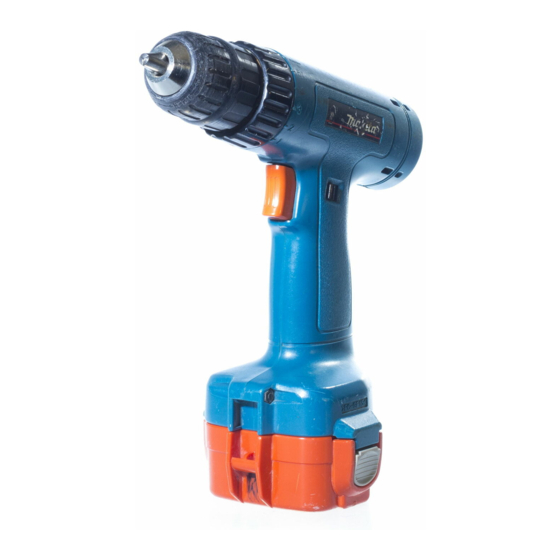Makita 6223D Інструкція з експлуатації - Сторінка 5
Переглянути онлайн або завантажити pdf Інструкція з експлуатації для Дриль. Makita 6223D. Makita 6223D 12 сторінок. Cordless driver drill
Також для Makita 6223D: Інструкція з експлуатації (11 сторінок)

ENGLISH
1
Battery cartridge
2
Button
3
Charging light
4
Battery charger
5
Sleeve
SAFETY INSTRUCTIONS
WARNING! When using battery operated tools basic
safety precautions, including the following, should
be followed to reduce the risk of fire, leaking batter-
ies and personal injury: Read these instructions
before operating this product and save these instruc-
tions.
For safe operation:
1.
Keep work area clean
– Cluttered areas and benches invite injuries.
2.
Consider the work environment.
– Do not expose the tool to rain. Keep work area well
lit. Do not use tools in the presence of flammable
liquids or gases.
3.
Keep children away
– Do not let visitors touch the tool. Keep visitors
away from work area.
4.
Store batteries or idle tools
– When not in use, tools and batteries should be
stored separately in a dry, high or locked up place,
out of reach of children.
– Ensure that battery terminals cannot be shorted
by other metal parts such as screws, nails, etc.
5.
Do not force the tool
– It will do the job better and safer at the rate for
which it was intended.
6.
Use the right tool
– Do not force small tools or attachments to do the
job of a heavy duty tools. Do not use tools for pur-
poses not intended.
7.
Dress properly
– Do not wear loose clothing or jewellery, they can
be caught in moving parts. Non-skid footwear is
recommended when working outdoors. Wear pro-
tecting hair covering to contain long hair.
8.
Use protective equipment
– Use safety glasses and if the cutting operation is
dusty, a face or dust mask.
9.
Connect dust extraction equipment
– If devices are provided for the connection of dust
extraction and collection ensure these are con-
nected and properly used.
10. Do not abuse the supply cord (if fitted)
– Never carry the tool by the cord or yank it to dis-
connect from the socket. Keep the cord away from
heat, oil and sharp edges.
11. Secure the work
– Use clamps or a vice to hold the work. It is safer
than using your hand and it frees both hands to
operate the tool.
12. Do not over-reach
– Keep proper footing and balance at all times.
Explanation of general view
6
Tighten
7
Ring
8
Switch trigger
9
Reversing switch
10 Pointer
13. Maintain tools with care
14. Disconnect tools
15. Remove adjusting keys and wrenches
16. Avoid unintentional starting
17. Stay alert
18. Check damaged parts
19. Warning
20. Have your tool repaired by a qualified person
21. Disposal of battery
11 Drill marking
12 Adjusting ring
– Keep cutting tools sharp and clean for better and
safer performance. Follow instructions for lubrica-
tion and changing accessories. Inspect tool cords
periodically and if damaged have repaired by an
authorized service facility.
– Where the design permits, disconnect the tool
from its battery pack when not in use, before ser-
vicing and when changing accessories such as
blades, bits and cutters.
– Form the habit of checking to see that keys and
adjusting wrenches are removed from the tool
before turning it on.
– Do not carry the tool with a finger on the switch.
– Watch what you are doing. Use common sense.
Do not operate the tool when you are tired.
– Before further use of the tool, a guard or other part
that is damaged should be carefully checked to
determine that it will operate properly and perform
its intended function. Check for alignment of mov-
ing parts, free running of moving parts, breakage
of parts, mounting and any other condition that
may affect its operation. A guard or other part that
is damaged should be properly repaired or
replaced by an authorized service facility unless
otherwise indicated in this instruction manual.
Have defective switches replaced by an authorized
service facility. Do not use the tool if the switch
does not turn it on and off.
– The use of any accessory or attachment, other
than recommended in this instruction manual, may
present a risk of personal injury.
– Ensure that the battery pack is correct for the tool.
– Ensure that the outside surface of battery pack or
tool is clean and dry before plugging into charger.
– Ensure that batteries are charged using the cor-
rect charger recommended by the manufacturer.
Incorrect use may result in a risk of electric shock,
overheating or leakage of corrosive liquid from the
battery.
– This tool is constructed in accordance with the rel-
evant safety requirements. Repairs should only be
carried out by qualified persons using original
spare parts, otherwise this may result in consider-
able danger to the user.
– Ensure battery is disposed of safety as instructed
by the manufacturer.
5
